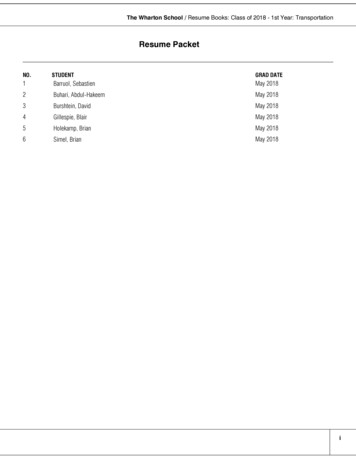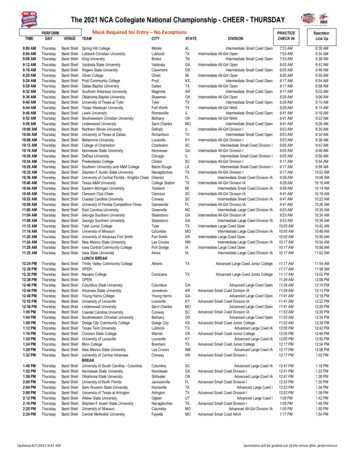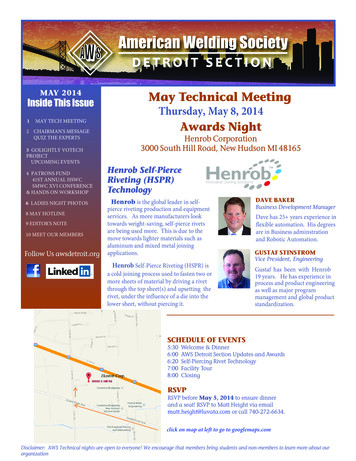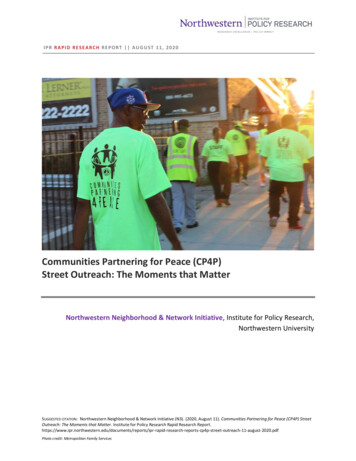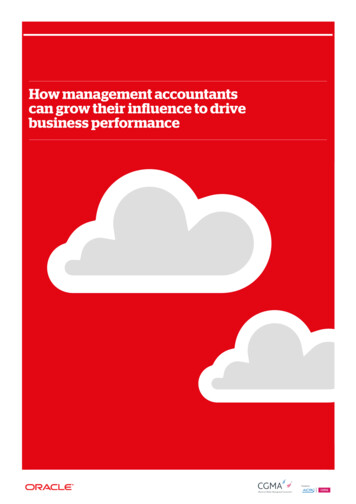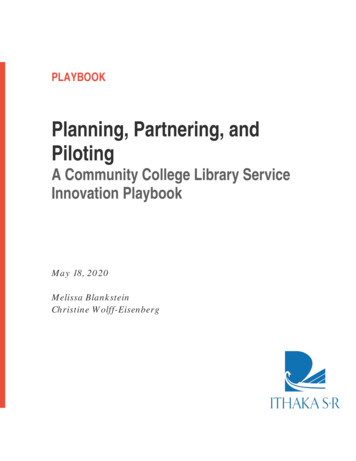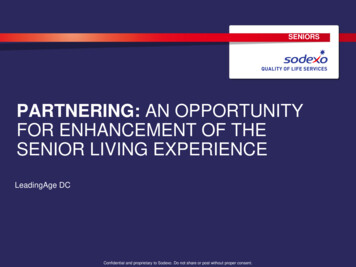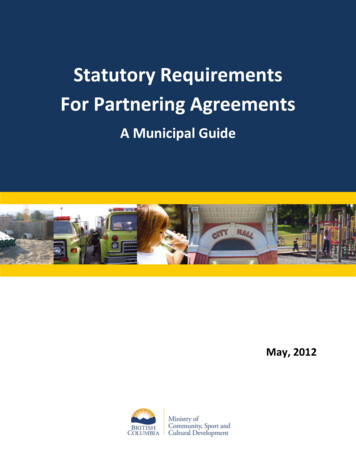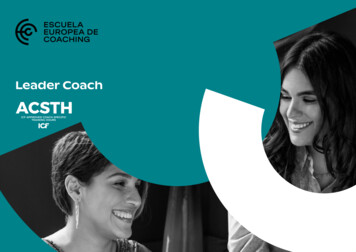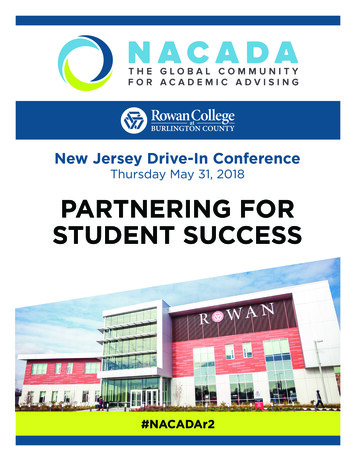
Transcription
New Jersey Drive-In ConferenceThursday May 31, 2018PARTNERING FORSTUDENT SUCCESS#NACADAr2
Joanne K. Damminger, EdDKeynote SpeakerJoanne Damminger is currently an adjunct professorat Wilmington University in the Doctoral Programin Higher Education Leadership and Innovation.She also is an adjunct at Rowan University in theMasters in Higher Education Program, currentlyteaching “Academic Advising in Higher Education.”She is a member of NACADA’s Academic AdvisingConsultant and Speaker Service. She is a pastPresident of NACADA: The Global Communityfor Academic Advising. Joanne previously servedthe students at Delaware Technical CommunityCollege in several positions including AssistantVice President for Student Affairs before retiringfrom full-time work very recently (less than2 months ago).In her higher education experiences, Joanne has provided leadership forstudent affairs divisions at two-year and four-year colleges and universities.Her responsibilities have included leading the areas of academic advising; careerservices; veterans and service members programs; services for students withdisabilities; student activities and organizations; athletics; recruitment andadmissions; international student services; and new student orientation and otherstudent success programs.Joanne presents nationally and internationally on topics related to retention,student success and completion, academic advising, career advising, ethicsin advising, the first-year experience, and post-traditional students.Joanne is published most recently in the 2017 publication, “Academic Advisingand the First College Year,” “The New Advisor Guidebook: Mastering the Art ofAcademic Advising (2015),” and the “NACADA Advising Administration Monograph2011).” She edited and authored a chapter in the “Handbook of CareerAdvising” (2009) and is also known for various otherpublications related to career and academic advising.Joanne earned her Doctorate in Educational Leadership,a Master of Arts Degree in Student Personnel Services, and aBachelor of Arts Degree in Elementary Education fromRowan University.2 #NACADAr2
New Jersey Drive-In Conference8:30 a.m. - 9:00 a.m.Check-In and Continental BreakfastStudent Success Center9:00 a.m. - 9:15 a.m.Welcome and Overview of DayStudent Success Center9:15 a.m. - 10:00 a.m.KeynotePartnership People CollaborationStudent Success Center10:15 a.m. - 11:15 a.m.Concurrent Session ISee Page 411:30 a.m. - 12:30 p.m.Concurrent Session IISee Page 512:30 p.m. - 1:30 p.m.LunchStudent Success Center1:45 p.m. - 2:45 p.m.Concurrent Session IIISee Page 62:45 p.m.ClosingStudent Success CenterLaurel HallTECVotta HallScience BuildingStudent SuccessCenter#NACADAr2 3
Concurrent Session I10:15 a.m. – 11:15 a.m.Academic Failure is Not the End of the Road:Helping Students Come Back From anAcademic SetbackStephanie Ramsey, City College of New YorkStudent Success Center 138Academic Advisors do an excellent job providing academic and personal support to guide students through our academic programs, as well asthe course selection process. We help students clarify their academicand professional goals as we advise them in issues regarding majors andrelated career choices. We also provide them with accurate informationabout educational options, requirements, policies and procedures. Buthow well do we teach them how to be resilient when facing academicfailure? How well have Advisors guided failing students through thelearning process? What do we do when a student comes to us and admits that he/she is struggling in one or more of his/her classes? Do wesimply tell them to study harder? Do we refer them to tutoring? Thissession will explain why Advisors must delve deeper to find out what thestudent’s learning process is in order to help them overcome academicfailure. If the Advisor doesn’t know how the student prepares for class/exams, the advisor can only provide limited guidance. Attendees willleave the session knowing and understanding how Bloom’s Taxonomy,the Study Cycle and Intense Study Sessions impact student performance and how to incorporate these topics into their advising sessions.Attendees can then return to their campus and begin to help studentslearn to adapt their thinking and their study processes.Creating Partnerships for Transfer Student SuccessAnthony Urmey, Monmouth UniversityJennifer Shendock, Monmouth UniversityVotta 131Recently under new leadership, Monmouth University’s Office ofTransfer and Undeclared Services recognized the opportunity to improve the experience of the (approximately) 30% of undergraduateswho identify as transfer students. This presentation aims to explore thedevelopment of campus partnerships to ensure transfer student successand satisfaction. Topics of discussion will mirror the office’s goals toprovide a seamless transition into the university, encourage studentsto become active participants in their education as they work towardstimely graduation, career preparation, and developing a sense of community among transfer students.Advising International Students: What To KnowJennifer L. Martin, Rowan College at Burlington CountyVotta 225This presentation will help attendees better understand the academic regulations to which international students must adhere in order tomaintain their visas. This presentation will also assist academic advisorsin better understanding the many cultural issues that international students face when attending an American institution of higher education,such as culture shock and differences in academic norms. Lastly, thispresentation will help attendees remain mindful of contemporary political issues that many of today’s international students face which affectacademic success and retention rates.4 #NACADAr2Modern College: Highlighting Partnershipsfrom the Mercer County Community CollegeHealth Professions DivisionNichol Killian, Mercer County Community CollegeAndrew Millin, Mercer County Community CollegeLisa Shave, Mercer County Community CollegeVotta 148The top two goals of the Mercer County Community College 20162021 Strategic Plan are to ensure student success and expand innovativepartnerships. Faculty and staff in the Health Professions Division, one ofthree academic divisions, have been working to accomplish these goals.Examples include collaboration with success coaches from the InnovationOnline Education and Student Success Division to promote retention incourses, and development of prior learning assessment agreements withthe Lifelong Learning Division to create alternative credit completionpathways. These examples and more will be shared in this concurrentsession by two academic program coordinators and a success coach.Stories from Business School Studentson Academic Probation: A Grounded Theory ResearchAlyssa LaPatriello, Rutgers University - NewarkTEC 215This presentation details the benefits of conducting grounded theoryresearch on 30 business school students placed on academic probation.The benefits we obtained include expanded collaboration with businessschool advisors, intriguing findings with operational implications, affirmation of our advising model choice, and confirmation that impactfulresearch is possible given stringent budget and staffing constraints. Thisresearch can benefit presentation attendees by providing new insightsinto a population that can be challenging to support.To Self-Disclose or Not to Self-DiscloseNatalie Fein, Community College of PhiladelphiaMeghan Ingstrup, Rutgers University - New BrunswickVotta 144Mutual trust and respect are cornerstones of a successful advisor-studentpartnership. As advisors we often wonder how we can establish this relationship with our students in the brief time we spend with them. Thispresentation will explore one such way: Self-disclosure. Through a discussion of best practices and examples, discover how powerful appropriateself-disclosure can be in building partnerships with your students. Learnwhat self-disclosure is, how it differs from “sharing”, and how it can buildrapport, normalize behavior, reduce embarrassment, and provide hope.Working Together to Advise for Student Successin Developmental MathM. Bridget White, Kean UniversityTEC 217Description of Kean University General Education Math programstructure and student advisement from testing to learning success! Thispresentation with outline successful changes in our placement testingpre-advisement, course delivery and faculty advisement housed in ourGeneral Education program. The highlight of our approach is associated with and 20 % improvement in developmental math pass rate.
Concurrent Session II11:30 a.m. – 12:30 p.m.Advising and the First Year Seminar: Leveraginga Captive Audience to Meet Advising ObjectivesAmanda Carcione, Montclair State UniversityLaura Manresa, Ocean County CollegeSabrina Mathues, Brookdale Community CollegeDonna Rogalski, NJ Center for Student SuccessVotta 131This interactive session will champion the potential of a First YearSeminars (FYS) and Academic Advising partnership by discussing howadvisors and FYS faculty can best collaborate to improve student outcomes in both FYS and advising domains. The presenters draw on leadership experiences within the statewide Guided Pathways movement,the presenters’ own professional backgrounds, as well as participants’experiences, to discuss applications and implications across multiplepostsecondary settings.Can We Talk: Addressing Mental Health on CampusNicholas LaTorre, Rowan College at Burlington CountyVotta 225Currently, mental health is discussed more than ever on college campuses and TV shows like 13 Reasons Why acknowledge such concerns.However, suicide rates have increased more than 200% in the last 50years for those age 15-24 and the emotional health for college freshmenis at its lowest in 25 years. This presentation will continue the conversation on campus mental illness and provide insight for the non-mentalhealth professional working with students every day. We will activelydiagnose language, review current trends, and explore ways to break thestigma and silence for those that often do not feel they have a voice.Cross-Campus Partners: Allies in Student SuccessErica Kalinowski, The College of New JerseyTEC 217Whether working with specific populations, majors or programs, advising professionals rely heavily on our cross-campus partnerships to support students. Advising doesn’t happen in a silo, and when students areexperiencing challenges in their academics and beyond, a holistic teamapproach is often the formula that works best. TCNJ’s Center for Student Success provides supplemental academic advising and coaching toour entire campus and are regularly connecting with key support officesto foster academic and personal perseverance. In this presentation, wewill touch on some of the ways in which we work together- with bothformal processes and soft hand-offs, and allow for time for the group toshare their collaborative efforts with their favorite allies.Defining Our Partnership ResponsibilitiesThomas J. Grites, Stockton UniversityPeter L. Hagen, Stockton UniversityStudent Success Center 138This program will examine the contexts in which we strive to meet theelements of the conference theme - partnerships and student success.Who establishes these partnerships? Who implements them? How arethey defined? By whom? What responsibilities do academic advisorshave in these efforts?The Real Mid-Level Advisors of NACADA:Partners in #HorizontalBrandingGavin Farber, Temple UniversityVotta 148In a competitive profession like higher education, the climb to the topcan be difficult. When promotions are unavailable to mid-level professionals, it can be challenging for them to feel appreciated in their role.In reality, when a vertical path is unavailable at an institution, it couldbe horizontal movements that afford the best opportunities for aiding inprofessional branding. Join the conversation to learn how you can forgea rich, rewarding career independent of the conventional “climbing theladder” approach. Review new strategies to overcome your struggles andconquer your career path!The Successful Student Transition to College:Including the Family Support Team in the Process!Robert Bullard, Rowan UniversitySean Hendricks, Rowan UniversityJulia Beth Rey, Rowan UniversityVotta 222This session will share best practices with how Rowan University embraces the family. Many parents have traveled on field trips, participatedin classroom parties, fundraised, and decorated for dances. In a timeof social media, email, and network systems, parents have had instantaccess to academic records; communication in K-12 flows easily andsteadily. However, as their child enters college, this communication becomes limited. FERPA regulations and college policies put control andflow of information into the student’s hand. How does the family support their student when information is limited? Working as a team, theUniversity, student, and parents can best support students to becomeempowered and self-sufficient adults.It Takes a Village to Advise the Whole Student!(Roundtable)Thomas Bieber, Monmouth UniversityJanice C Stapley, Monmouth UniversityVotta 144We will conduct a workshop beginning with an example of how we collaborate across many offices at our university to best advise student-athletes as whole people. After our introduction, we will facilitate severalbreakout groups designed to have participants brainstorm about: 1 thedifferent aspects of a student they need to understand to capture thewhole person, 2 the offices with which they need to increase communication and collaboration to best serve students, 3 participants’ perception of priority registration practices at their school, 4 their currentand proposed practices for referring students with mental health issues.#NACADAr2 5
Concurrent Session III1:45 p.m. – 2:45 p.m.A Solution for the Decline in the Liberal Arts:Digital Literacy through Certificatesof Undergraduate Study (CUGS)Kimberly Poolos, Rowan UniversityMichael Schillo, Rowan UniversityVotta 144With the increasing importance of technology in the workforce, LiberalArts students may feel “under confident” in their major’s marketability.Rowan University offers Certificates of Undergraduate Study (CUGS),less intensive than a minor, which allows students to take concentrated coursework in an area of study. The Computer Science Departmentoffers 4 distinct CUGS, open to all majors, which allows students togain technical skills and hone their analytical skills. With each CUGSrequiring only 4 courses, Liberal Arts students have the flexibility togain a competitive edge and increase the marketability of their degreeby enhancing their technical skill set.Advising from the Inside OutLisa Sanon-Jules, Rutgers UniversityJennifer Trancucci, Rutgers UniversityVotta 131The Rutgers University Honors College- New Brunswick was createdin 2015 with the goal of recruiting and retaining high achieving students. Our set-up is unique. We operate outside of the five academic/professional schools and we are distinct from each of the school-basedhonors program. Our model recruits students from all five schools toengage with one another in a unique living-learning community. Ourfirst year students reside in a state of the art building that includes classrooms, offices and common spaces. The goal of the Honors College isto partner for student success. Internally, we operate as a one stop shopwith members of Honors College Advising, Admissions and StudentLife operating in one space. This program will look at where we havebeen and where we are going. We will look critically at our strengthsand weaknesses and ask for insights from our audience members.Meaning Making in Higher Education; An InteractiveWorkshop on Partnering with a PurposeKate Gonzalez, Rowan College at Burlington CountyDee Royer, Rowan College at Burlington CountyStudent Success Center 138Student success is often synonymous with good grades, career preparation, and job readiness. While higher education institutions tend to excelwithin these areas, research shows that a vast majority of college graduates are unhappy, unfulfilled, and disengaged in their careers. This presentation will be highly interactive and include a personal evaluation ofhow each participant finds meaning in their own life and career. We willexplore ways in which, as higher education professionals, we can advisethe Whole Person, and encourage students to begin asking questions related to finding meaning in their own life, personally and professionally.6 #NACADAr2Developing Student Workers (Roundtable)Adrianne Dahms, Rowan College at Burlington CountyMatthew Vazquez, Rowan College at Burlington CountyVotta 222In this session, we will discuss how our institutions are developing thestudent workers that we have on campus. These students are not onlygetting an educational experience, but also a professional one. It is ourjobs to provide them with the tools to be successful academically andprofessionally. We will explore, through a round table discussion, whatwe are doing to develop the student workers that are working in variouspositions on our campuses. Through this discussion we will see how different institutions support and professionally develop student workersto prepare them for the career goals they have set for themselves.Improving Access: Expanding Writing Center Capacityto Support Diverse Student NeedAmanda Connelly, Ocean County CollegeSusan Pagano, Ocean County CollegeSara Revello, Ocean County CollegeTEC 215This presentation will describe how the Writing Center at OceanCounty College has expanded its capacity to meet the diverse academicneeds of students. This includes work done in the Center, such as oneon-one support and programming, and work done outside the Center,both in the classroom and virtually. We will show how these initiativeshave a significant, positive impact on student success and retention.Success Coaching: A Collaborative Partnership (Panel Presentation)Victoria Onori Bowman, Mercer County Community CollegeNichol Killian, Mercer County Community CollegeJehan Mohamed, Mercer County Community CollegeVotta 225Using an individualized and intrusive approach, Mercer County Community College Success Coaches view 21st Century students througha holistic lens, providing each student with personalized academic andskills-based learning opportunities. Coaches build relationships withstudents to help them better understand their pathway to success andachievement of their goals.Success Coaching involves collaboration, not directives, by offeringguidance and support. Through pointed questions, encouraging feedback, and accountability, Coaches engage and empower students tomake their own best choices. Students are in charge of their journeys;Success Coaches help guide them toward persistence, retention, andcompletion as part of that plan.
About NACADANACADA is an association of professional advisors, counselors, faculty, administrators,and students working to enhance the educational development of students.NACADA VisionRecognizing that effective academic advising is at the core of studentsuccess, NACADA aspires to be the premier global association for thedevelopment and dissemination of innovative theory, research,and practice of academic advising in higher education.NACADA MissionNACADA promotes student success by advancing the field of academicadvising globally. We provide opportunities for professional development,networking, and leadership for our diverse membership.Get Involved!We’re so happy you were able to attend the NJ Drive-In Conference today,and want to encourage you to continue your involvement with NACADA!Check out all of the opportunities for involvement, including joiningan advising community, writing for NACADA publications, attendingadditional professional development, and so much more by going toNACADA’s website: nacada.ksu.edu.Social Media:Facebook: NACADA-The Global Community for Academic AdvisingTwitter: @NACADAInstagram: @NACADABlog: https://nacada.wordpress.com/#NACADAr2 7
NOTESThank you for your support and partnership in promoting student success!Connect and share what you’ve learned today by using #NACADAr28 #NACADAr2
Masters in Higher Education Program, currently teaching "Academic Advising in Higher Education." She is a member of NACADA's Academic Advising Consultant and Speaker Service. She is a past President of NACADA: The Global Community for Academic Advising. Joanne previously served the students at Delaware Technical Community
